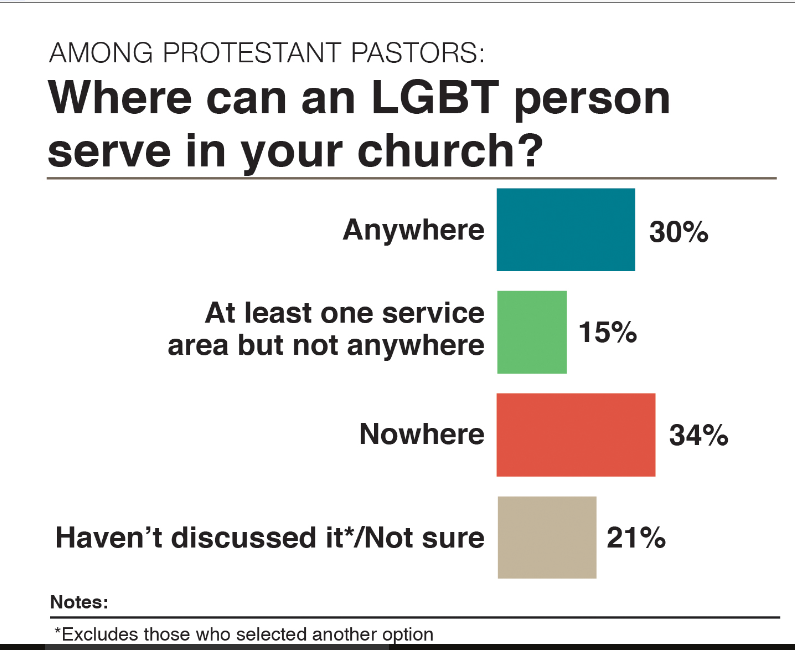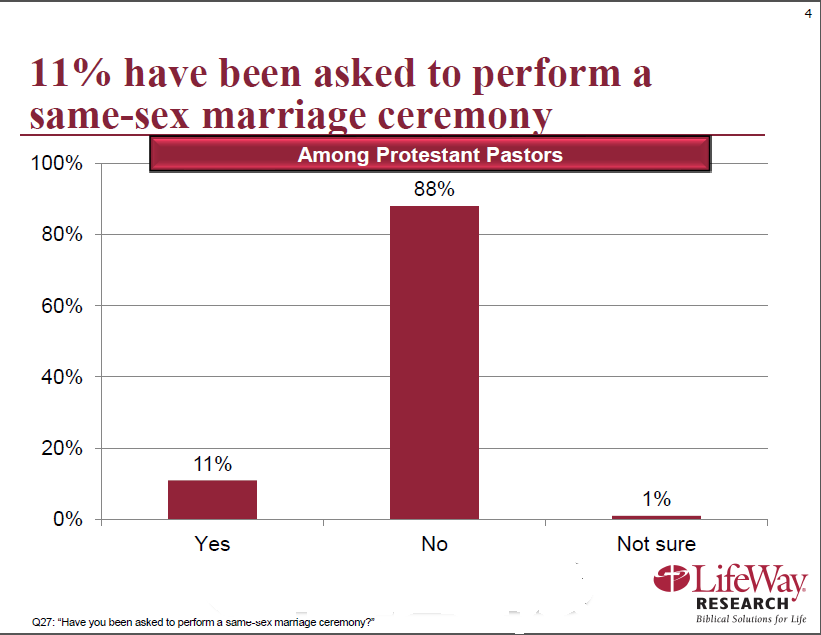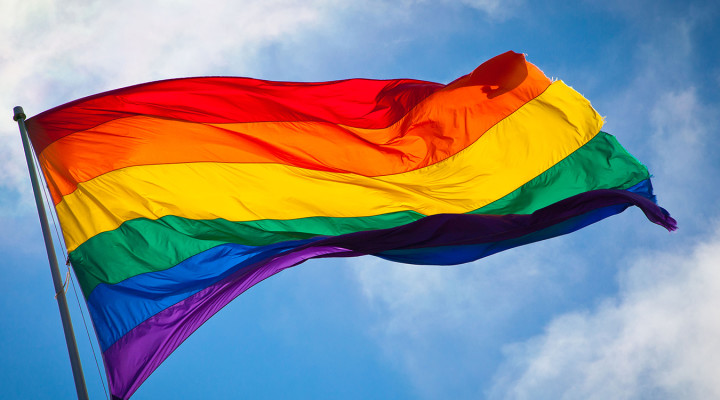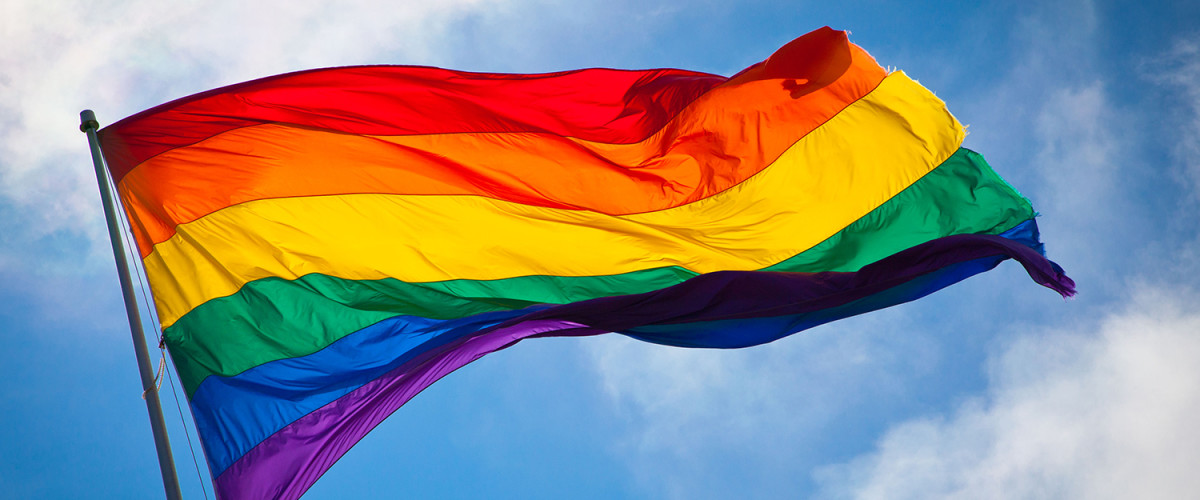A little over a year after the Supreme Court legalized same-sex marriage, Baptists remain among the most resistant to LGBT inclusion among U.S. Protestant groups, according to new data from LifeWay Research.
The research division of the Southern Baptist Convention’s publishing house LifeWay Christian Resources released a study Aug. 18 showing that just 8 percent of Baptist pastors say LGBT individuals can serve their church in any role open to other members. That compares to 30 percent of all Protestants and 51 percent in the mainline traditions. At 66 percent, Presbyterian/Reformed pastors are most likely to say their doors of service are open to all.
The report comes at a time when leaders of the Cooperative Baptist Fellowship are embarking on an “illumination project” to foster healthy discussion about differences of opinion on topics including the organization’s ban on hiring non-celibate gays and lesbians as staff or missionaries.
 More than half of Baptist pastors (54 percent) said there is no place in their church where LGBT people can serve. That ranks second to Pentecostals (58 percent) and compares to 34 percent of all Protestants saying there isn’t at least one avenue of service for gays. One in five (21 percent) say they have not discussed it or are not sure.
More than half of Baptist pastors (54 percent) said there is no place in their church where LGBT people can serve. That ranks second to Pentecostals (58 percent) and compares to 34 percent of all Protestants saying there isn’t at least one avenue of service for gays. One in five (21 percent) say they have not discussed it or are not sure.
Nearly half of Protestant pastors (44 percent) said LGBT persons can serve their church in helping and service roles. Fewer allow gays to serve in public leadership (33 percent), teaching (32 percent) and worship (32 percent) roles.
Just 10 percent of Baptist pastors say their church allows LGBT persons to serve in public leadership, teaching or worship, while 21 percent said they can fit in for helping or serving roles in a Baptist church.
Despite some predictions that Baptist churches would be inundated with demands to allow their facilities to be used for gay weddings, just 1 percent of Baptist pastors said they have asked to perform a same-sex marriage ceremony.
The June 26, 2015, decision in Obergefell v. Hodges prompted a spate of state laws designed to protect churches and clergy from liability for refusing to recognize gay marriage. Groups such as Alliance Defending Freedom urged congregations to update their bylaws to include a statement of doctrinal beliefs on marriage and sexuality in anticipation of possible litigation. Others warned that religious organizations could risk losing their tax-exempt status.
 Former SBC President Jack Graham advised Christians to prepare for civil disobedience. “We want to work in the system. We want to support our government. We want to obey its laws,” the pastor of Prestonwood Baptist Church in Plano, Texas, told Fox News commentator Todd Starnes. “But there’s a coming a day, I believe, that many Christians personally and churches corporately will need to practice civil disobedience on this issue.”
Former SBC President Jack Graham advised Christians to prepare for civil disobedience. “We want to work in the system. We want to support our government. We want to obey its laws,” the pastor of Prestonwood Baptist Church in Plano, Texas, told Fox News commentator Todd Starnes. “But there’s a coming a day, I believe, that many Christians personally and churches corporately will need to practice civil disobedience on this issue.”
Then-SBC president Ronnie Floyd termed the Supreme Court ruling a “Bonhoeffer moment” for the denomination. “As for me — and I also believe for thousands of pastors in this nation, but you are going to have to speak for yourself — but as for me, I declare to everyone today, as a minister of the gospel, I will not officiate over any same-sex unions or same-sex marriage ceremonies. I completely refuse,” the pastor of Cross Church in Northwest Arkansas declared.
A 2015 SBC resolution declared “that Southern Baptists recognize that no governing institution has the authority to negate or usurp God’s definition of marriage” and “no matter how the Supreme Court rules, the Southern Baptist Convention reaffirms its unwavering commitment to its doctrinal and public beliefs concerning marriage.”
Overall just 11 percent of Protestant senior pastors in the LifeWay study said they had been asked to perform a same-sex marriage. Pastors who identify as mainline were three times more likely to have been asked than evangelical pastors (18 percent vs. 6 percent). Pastors 55 and older (14 percent) were twice as likely as those 54 and younger (7 percent) to have been asked to officiate a same-sex ceremony.
“Most couples, if they want a church wedding, will ask a pastor they know or who they think will support them,” said Scott McConnell, executive director of LifeWay Research. “For same-sex couples, this appears to be an older Presbyterian pastor.”
The Cooperative Baptist Fellowship adopted a “statement of organizational value”— later re-labeled a “personnel and administrative funding policy”— in 2000 to stake out a centrist position on homosexuality at a time when leaders felt the movement was being defined by accusers from the right and CBF partners pushing boundaries on the left.
After a workshop at the 2010 General Assembly in Winston-Salem, N.C., called “A Family Conversation about Same-Sex Orientation” drew a standing-room-only crowd, the CBF joined Mercer University to co-sponsor “a [Baptist] Conference on Sexuality and Covenant” in April 2012.
Since the June 15 shooting at a gay nightclub in Orlando, Fla., 477 people have signed a Statement of Solidarity pledging to work for full inclusion of LGBT persons in CBF life.
Previous stories:
‘Illumination Project’ seeks unity amid diversity in CBF
CBF General Assembly spawns two statements condemning Orlando massacre


